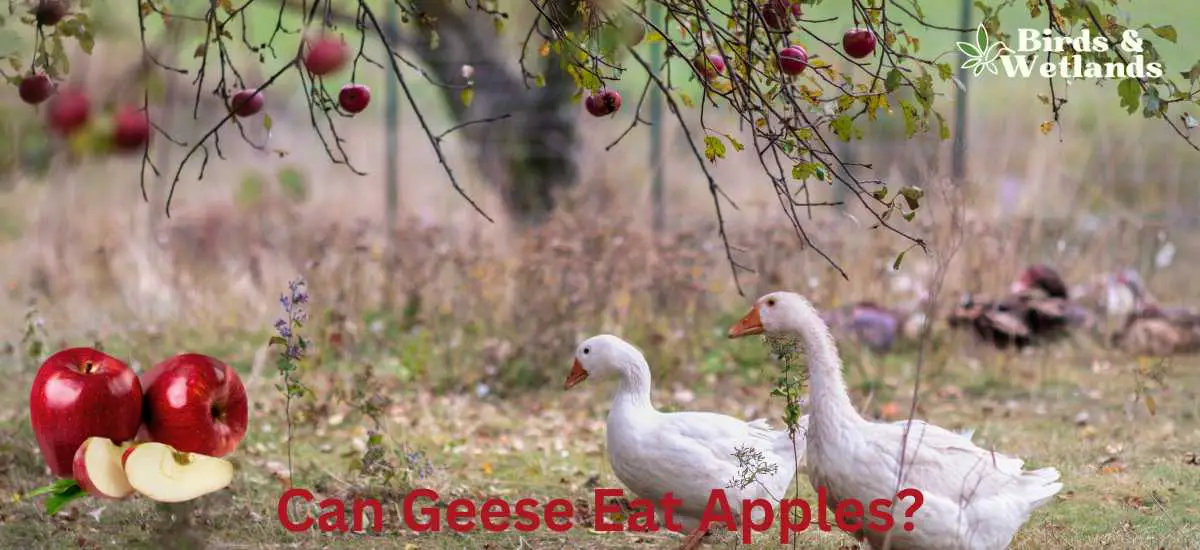Geese are a common sight in many parks and gardens, and many people enjoy feeding them. However, not all foods are suitable for geese, and it’s important to understand what they can and cannot eat.
One common question is whether geese can eat apples.
In this article, we’ll explore the diet of geese and what they can and cannot eat, to help you make informed choices when feeding these beautiful birds.
Geese can eat apples, but they should only be fed in moderation as a supplement to their normal diet. It’s important to offer a variety of foods to provide a balanced diet, and to avoid overfeeding and foods that are harmful to their health.
Can Geese Eat Apples?
Yes, geese can eat apples. Apples are a healthy treat for geese and provide them with essential nutrients such as vitamins and fiber.
However, it’s important to note that apples should only be fed in moderation and as a supplement to their normal diet. Overfeeding geese with apples can lead to digestive problems and malnutrition.
Apples provide several nutritional benefits to geese, including:
- Fiber: Apples are a good source of fiber, which helps to promote healthy digestion and prevent constipation.
- Vitamins: Apples are rich in vitamins, such as vitamin C and vitamin K, which are essential for overall health and wellbeing.
- Antioxidants: Apples contain antioxidants, which help to protect against damage from free radicals and promote a strong immune system.
- Minerals: Apples contain minerals, such as potassium, which are important for maintaining healthy heart function, nerve and muscle activity, and fluid balance in the body.
| Nutrient | Amount (per 100 g) | Benefit to Geese |
|---|---|---|
| Fiber | 2 g | Promotes healthy digestion and prevents constipation |
| Vitamin C | 4.6 mg | Supports a strong immune system and promotes overall health |
| Vitamin K | 5.2 µg | Essential for blood clotting and maintaining healthy bones |
| Potassium | 160 mg | Supports healthy heart function, nerve and muscle activity, and fluid balance |
| Antioxidants | Various | Protects against damage from free radicals and promotes a strong immune system |
Serving apples to geese is relatively simple and can be done in the following steps:
Tips for Feeding Geese Apples
When feeding geese, it’s important to follow these tips to ensure their health and wellbeing:
- Only feed geese in moderation
- Offer a variety of foods to provide a balanced diet
- Avoid overfeeding, as this can lead to digestive problems and obesity
- Offer fresh water at all times
- Wash the apples: Before feeding the apples to geese, it’s important to wash them thoroughly to remove any dirt, chemicals, or other contaminants.
- Cut the apples into slices: Once washed, cut the apples into slices or smaller pieces to make them easier for the geese to consume.
- Offer the apples in moderation: Apples should only be offered in moderation as a supplement to the geese’s regular diet, which should include a variety of other foods. Overfeeding apples can lead to digestive issues.
- Observe the geese’s behavior: While feeding the geese, it’s important to be cautious of their aggressive behavior and to keep a safe distance from them. It’s also important to monitor their intake to ensure they are not overeating.
When it comes to feeding apples to geese, any variety of apples can be offered, as long as they are washed, sliced, and offered in moderation. However, some types of apples may be more desirable to geese due to their sweetness and texture, including:
- Red Delicious: A sweet and juicy apple that is popular among geese.
- Granny Smith: A tart and crunchy apple that geese may find appealing.
- Golden Delicious: A sweet and crisp apple that is enjoyed by many geese.
- Gala: A sweet and juicy apple that is often a hit with geese.
What do Geese Typically Eat?
Geese are omnivores, meaning they eat both plants and animals. In the wild, they feed on a variety of foods, including grasses, roots, insects, and small fish.
However, their diet will vary depending on the season and their environment. In captive environments, such as parks, geese may be fed a variety of grains, bread, and vegetables.

